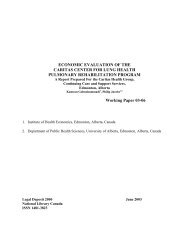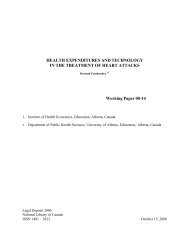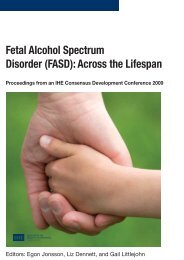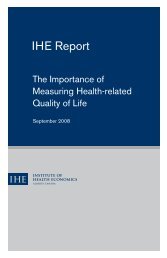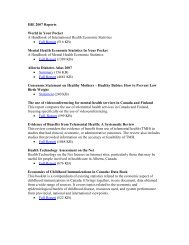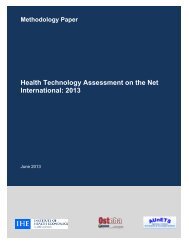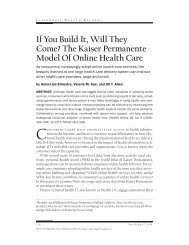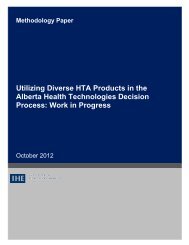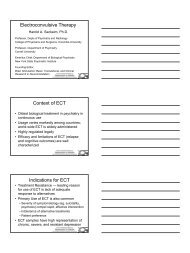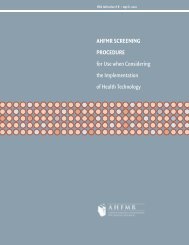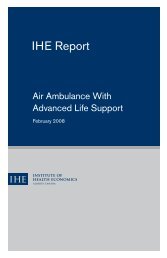Table T.F.3-5: Long-term effects <strong>of</strong> bariatric treatment strategies on overall mortality 67Women only Men only Women and men combinedNo. <strong>of</strong> studies: two studies conductedin the United StatesParticipantsStudy one: N =14,407; white, normalweight or overweightStudy two: N = 43,457 (no preexistingdiseases, N = 28,388; <strong>obesity</strong>-relateddiseases, N = 15,069); white,overweight womenFollow-upStudy one: median 13.6 years <strong>for</strong>survivorsStudy two: 12 years <strong>for</strong> survivors; 7.5years <strong>for</strong> decedentsResultsStudy one: Compared to women withnormal weight (reference group),mortality risk significantly increased inoverweight/obese women with weightloss. However, the two groups werenot comparable.Study two: Included women who wereat least overweight. In<strong>for</strong>mation aboutparticipants’ intention to weight lossand the presence <strong>of</strong> any <strong>obesity</strong>-relateddiseases were obtained. The “no weightchange” subgroup was used as areference group.For those with <strong>obesity</strong>-related diseasesand intentional weight loss, weight lossgreater than 20 pounds within one yearsignificantly improved the mortalityrisk when compared to similar peoplewith no weight change.No. <strong>of</strong> studies: three studies, one conducted in each <strong>of</strong> the United States,Sweden, and the UKParticipantsThe US study: N = 49,337 (no pre-existing disease, N = 36,280; with healthproblems, N = 13,057); white men with a BMI > 27 kg/m 2The Swedish study: N = 5722, overweight, obeseThe British study: N: NA at baseline; 5267 at follow-up; normal weight oroverweight menFollow-upThe US study: 12.9 years <strong>for</strong> survivors; 7.3 years <strong>for</strong> decedentsThe Swedish study: 12 years <strong>for</strong> weight change average; 22 years <strong>for</strong> wholestudyThe British study: 7 yearsResultsThe US study: Included patients who were at least overweight. The intention<strong>of</strong> weight loss and the presence <strong>of</strong> health conditions were separatelyconsidered. Compared to the reference group <strong>of</strong> weight stable men, intentionalweight loss greater than 20 pounds <strong>for</strong> longer than 1 year were detrimental <strong>for</strong>all men. Unintentional weight loss was also marginally detrimental.The Swedish study: Compared with similar men who were weight-stable,weight loss was detrimental <strong>for</strong> non-cancer mortality. However, theintentionality <strong>of</strong> weight loss was not reported.The British study: Conducted an analysis on overweight men and adjusted <strong>for</strong>several variables accounting <strong>for</strong> demographic variations and probablyunderlying diseases. Compared with the weight-stable subgroup, intentionalweight loss improved mortality risk; however, there was no difference in thosewith comorbidities or who lost weight unintentionally.Overall, the impact <strong>of</strong> weight loss on mortality in men is not clear. Two studiesindicate weight loss to be detrimental while the most recent cohort showedclear benefits if the weight loss is a personal decision.Meta-analysis <strong>of</strong> three studies: Compared with the reference group <strong>of</strong>weight-stable men, the overall effective weight loss is slightly detrimental with ahazard ratio (HR 1.15; 95% CI: 1.08 to 1.01). When studies with onlyintentional weight loss are considered, the HR (1.01; 95% CI: 0.99 to 1.09)become non-significant.No. <strong>of</strong> studies: three studies, one conducted in each <strong>of</strong>United States, Finland, and CanadaParticipantsThe US study: N = 6391, BMI ≥ 25 kg/m 2The Finnish study: N = 4466, BMI ≥ 25 kg/m 2The Canadian study: N = 6781; morbidly obeseFollow-upThe US study: 9 years after weight change (mean 8 years)The Finnish study: 18 years after recorded weight changeThe Canadian study: maximal 5 yearsResultsThe US study: Adjusted <strong>for</strong> more than 13 variables, andalso attempted to account <strong>for</strong> known underlying diseases.For those who claimed to be trying to lose weight, theeffects were marginally beneficial if they remained weightstableor lost small amounts.The Finnish study: Observed that even <strong>for</strong> those withintentional weight loss,the effect <strong>of</strong> weight loss wasdetrimental.Meta-analysis <strong>of</strong> the above two studies: Indicated nosignificant difference between the groups.The Canadian study: Examined the impact <strong>of</strong> bariatricsurgery (RYGB, VBG) on mortality in morbidly obesepatients; 7/1035 patients (0.7%) in the surgery group diedand 354/5746 patients (6.2%) in the standard treatmentgroup died.Usually surgery is only considered when <strong>obesity</strong> is lifethreatening.Consequently, the surgery group does have asubstantially reduced mortality risk as compared to thesimilar control group who do not undergo surgery. Similarly,the effects <strong>of</strong> the surgery are difficult to disentangle fromany weight loss benefits <strong>for</strong> this subgroup.<strong>Bariatric</strong> <strong>treatments</strong> <strong>for</strong> <strong>adult</strong> <strong>obesity</strong> 148
Table T.F.3-6: Conclusions from the systematic reviews/HTAsSRs/HTAsConclusionDietary therapy/physical exerciseGalani & Schneider, 2007 56Shaw et al., 2006 57Curioni & Lourenco,2005 58Behavioural therapyShaw et al., 2005 15PharmacotherapyJohansson et al., 2009 59Padwal et al., 2004 20Li et al., 2005 60SurgeryKlarenbach et al., 2010 38Colquitt et al., 2009 62Multiple strategiesTsai, 2009 64Life style interventions were efficacious in the mid- to long-term prevention and treatment <strong>of</strong> <strong>obesity</strong> leading to a significant reduction in body weightand cardiovascular risk factors.Exercise is an effective weight loss intervention, particularly when combined with dietary interventions. Exercise is also an effective intervention <strong>for</strong>improving a range <strong>of</strong> secondary outcomes even when weight loss does not occur. No long-term morbidity and mortality benefits were associated withexercise. Exercise was shown to positively impact the intermediate outcomes commonly associated with cardiovascular disease.Adding exercise to diet produced greater weight loss than diet alone in overweight and obese individuals immediate after the intervention period andafter one-year follow-up, but did not produce better long-term maintenance <strong>of</strong> the lost weight.People who are overweight or obese benefit from psychological intervention, particularly behavioural and cognitive-behavioural strategies, to enhanceweight reduction. Psychological interventions are extremely useful when combined with dietary and exercise strategies. Other psychological interventionsare less rigorously useful <strong>for</strong> their efficacy as weight loss <strong>treatments</strong>.Available weight loss drugs differ markedly regarding risk <strong>of</strong> discontinuation due to adverse events, as well as differing in the underlying causes <strong>of</strong> theseevents. Given the large number <strong>of</strong> patients eligible <strong>for</strong> treatment, the low number needed <strong>for</strong> harm <strong>for</strong> rimonabant is a concern.Internal validity <strong>of</strong> studies was limited by high attrition rates. Orlistat, sibutramine, and rimonabant in trials <strong>of</strong> one year or longer are modestly effectivein reducing weight, and have differing effects on cardiovascular risk and adverse effects pr<strong>of</strong>iles.Sibutramine, orlistat, phentermine, diethylpropion (probably), bupropion, fluoxetine, and topiramate all promote weight loss when given along withrecommendations <strong>for</strong> diet. Sibutramine and orlistat are the two most-studied drugs. The amount <strong>of</strong> extra weight loss attributable to these medications ismodest (less than 5 kg at one year), but this amount still may be clinically significant.Although data from large, adequately powered, long-term RCTs are lacking, bariatric surgery seems to be more effective than standard care <strong>for</strong> thetreatment <strong>of</strong> severe <strong>obesity</strong> in <strong>adult</strong>s.Procedures that are mainly diversionary (e.g., BPD) result in the greatest amounts <strong>of</strong> weight loss, hybrid procedures (e.g., RYGB) are <strong>of</strong> intermediateeffectiveness, and restrictive procedures (e.g., AGB) result in the least amounts <strong>of</strong> weight loss. RYGB and AGB tended to lead to trade-<strong>of</strong>fs between therisk <strong>of</strong> adverse events and the need <strong>for</strong> procedure conversion or reversals. The evidence base was limited <strong>for</strong> sleeve gastrectomy.Surgery is more effective than conventional management. Certain procedures produce greater weight loss, but data are limited. The evidence on safety iseven less clear. Due to limited evidence and the poor quality <strong>of</strong> the trials, caution is required when interpreting comparative safety and effectiveness.Current evidence does not support the use <strong>of</strong> low-intensity to moderate-intensity physician counseling <strong>for</strong> <strong>obesity</strong>, by itself, to achieve clinicallymeaningful weight loss. Available data do not indicate how best to incorporate PCPs into more intensive approaches <strong>for</strong> achieving this goal. PCPcounseling, plus pharmacotherapy, or intensive counseling (from a dietitian or nurse), plus meal replacements may help patients achieve this goal.<strong>Bariatric</strong> <strong>treatments</strong> <strong>for</strong> <strong>adult</strong> <strong>obesity</strong> 149
- Page 1 and 2:
Alberta STE ReportBariatric treatme
- Page 3 and 4:
Alberta STE ReportBariatric treatme
- Page 5 and 6:
EXECUTIVE SUMMARYSocial and System
- Page 7 and 8:
Three surgical procedures—adjusta
- Page 9:
Costs of Bariatric Surgery and Pote
- Page 12 and 13:
Regulatory status .................
- Page 14 and 15:
TABLES AND FIGURESSection One: Soci
- Page 16 and 17:
ABBREVIATIONSAll abbreviations that
- Page 18 and 19:
LYMmMAMDMUHCNANHLBINHSNICENIHNNHNPH
- Page 20 and 21:
Bariatric physician: a licensed Doc
- Page 22 and 23:
High-density lipoprotein (HDL): a f
- Page 24 and 25:
Very-low-calorie diet (VLCD): a die
- Page 26 and 27:
Additional Internet searches were c
- Page 28 and 29:
This report addresses obesity in ad
- Page 30 and 31:
Many systemic factors have been ide
- Page 32 and 33:
Severe obesity is associated with d
- Page 34 and 35:
eport their height and under-report
- Page 36 and 37:
Also using self-reported data from
- Page 38 and 39:
An examination of overall obesity d
- Page 40 and 41:
Table S.2 presents the associationa
- Page 42 and 43:
• have multiple focal points and
- Page 45 and 46:
The main problem in any weight mana
- Page 47:
food, and a negative body image. As
- Page 50 and 51:
directly causes death. 61 To the ex
- Page 52 and 53:
The addition of a selected pharmaco
- Page 54 and 55:
lack of formal training in nutritio
- Page 56 and 57:
slightly more likely to have prescr
- Page 58 and 59:
selection criteria, have facilities
- Page 60 and 61:
Barriers to using appropriate baria
- Page 62 and 63:
Overview of adult obesityOver the p
- Page 64 and 65:
the need for regular physical activ
- Page 66 and 67:
phenylpropanolamine/25. Sibutramine
- Page 68 and 69:
Complianceand AdherenceDemand andut
- Page 70 and 71:
Aetna Clinical PolicyBulletinswww.a
- Page 72 and 73:
Overweight 123,821 172,971 157,623
- Page 74 and 75:
REFERENCES1. 2006 Canadian clinical
- Page 76 and 77:
34. Gostin LO. Fast and supersized:
- Page 78 and 79:
69. Klarenbach S, Padwal R, Wiebe N
- Page 80 and 81:
105. Hill JO, Thompson H, Wyatt H.
- Page 82 and 83:
141. Ross R, Bradshaw AJ. The futur
- Page 84 and 85:
172. Arkinson J, Ji H, Fallah S, Pe
- Page 86 and 87:
This section will address a set of
- Page 88 and 89:
dietary therapy is to reduce total
- Page 90 and 91:
Additional benefits of exercise ove
- Page 92 and 93:
medications that inhibit intestinal
- Page 94 and 95:
Rimonabant may be considered for pa
- Page 96 and 97:
Long-term complications are specifi
- Page 98 and 99:
Devices used for bariatric surgeryH
- Page 100 and 101:
Description of the Included Systema
- Page 102 and 103:
AEs for sibutramineAs compared to a
- Page 104 and 105:
Evidence on Efficacy/EffectivenessW
- Page 106 and 107:
Table T.7: Effects of behavioural t
- Page 108 and 109:
SurgeryDescription of the included
- Page 110 and 111:
follow-up time was 3 years. Results
- Page 112 and 113:
group as compared to the VBG group.
- Page 114 and 115:
The authors identified many methodo
- Page 116 and 117:
The investigators pointed out that
- Page 118 and 119:
approximately 3 to 5 kilograms. For
- Page 120 and 121:
for studies with a mean age of part
- Page 122 and 123: Examining whether use of any of the
- Page 124 and 125: Evidence from placebo-controlled cl
- Page 126 and 127: colorectal or gastroesophageal or f
- Page 128 and 129: Web of ScienceISI Interface License
- Page 130 and 131: AMA Clinical PracticeGuidelineswww.
- Page 132 and 133: critical appraisal of the included
- Page 134 and 135: APPENDIX T.B: EXCLUDED STUDIESTable
- Page 136 and 137: Padwal R, Li SK, Lau DC. Long-term
- Page 138 and 139: Quality subsection 1: At least MEDL
- Page 140 and 141: Quality subsection 5a:Study quality
- Page 142 and 143: Partially reported: The study types
- Page 144 and 145: Table T.C.1: Results of quality ass
- Page 146 and 147: Table T.C.1: Results of quality ass
- Page 148 and 149: APPENDIX T.D: CHARACTERISTICS OF SY
- Page 150 and 151: Table T.D.1: Characteristics of the
- Page 152 and 153: Table T.D.1: Characteristics of the
- Page 154 and 155: Table T.D.2: Characteristics of the
- Page 156 and 157: APPENDIX T.E: EVIDENCE TABLE ON SAF
- Page 158 and 159: Serious surgical complicationsSurgi
- Page 160 and 161: LSGmMAMDNAnssORQoLRCTRDRRRYGBSBPTGV
- Page 162 and 163: Table T.F.1-2: Weight loss - Behavi
- Page 164 and 165: Table T.F.1-4: Weight loss - Surger
- Page 166 and 167: Table T.F.2: Quality of life (QoL)
- Page 168 and 169: Curioni & Lourenco 2005 58Cholester
- Page 170 and 171: Table T.F.3-3: Risk factors/comorbi
- Page 174 and 175: Maciejewski et al., 2005 65Avenell
- Page 176 and 177: Table T.G.2: Effects of bariatric s
- Page 178 and 179: Table T.G.4: Effects of bariatric s
- Page 180 and 181: 18. Cerulli J, Lomaestro BM, Malone
- Page 182 and 183: 50. Health Canada Drug Product Data
- Page 184 and 185: SECTION THREE: ECONOMIC EVALUATIONC
- Page 186 and 187: Definition of bariatric surgical pa
- Page 188 and 189: etween surgical interventions, the
- Page 190 and 191: concluded that adding orlistat to L
- Page 192 and 193: Weight management program (WMP) ver
- Page 194 and 195: groups. Compared with standard care
- Page 196 and 197: Results from Analysis of Provincial
- Page 198 and 199: DiscussionThe objectives of the eco
- Page 200 and 201: surgical suites, and so on. The bud
- Page 202 and 203: APPENDIX E.A: LITERATURE SEARCH SUM
- Page 204 and 205: CRD Databases(DARE, HTA & NHS EED)h
- Page 206 and 207: Web of ScienceISI Interface License
- Page 208 and 209: NEOS Librarywww.library.ualberta.ca
- Page 210 and 211: Table E.A.2: Evidence table of revi
- Page 212 and 213: ResultHealth outcomesCostsMarginal
- Page 214 and 215: CostsMarginal analysisThe cost anal
- Page 216 and 217: Time Horizon/discount rateCurrency/
- Page 218 and 219: Objectivestudy perspective: society
- Page 220 and 221: ResultHealth outcomesCostsMarginal
- Page 222 and 223:
ResultHealth outcomesCostsMarginal
- Page 224 and 225:
S4Economic burden of obesityMean co
- Page 226 and 227:
15. Lacey LA, Wolf A, O'shea D, Ern
- Page 228 and 229:
Author Contribution StatementsPaula



